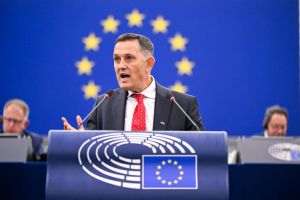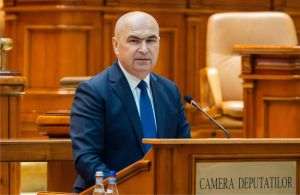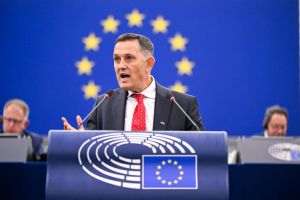The projects to complete the Răstoliţa and Bumbeşti-Jiu hydropower plants will continue despite the opposition of the non-governmental organizations that are sabotaging the efforts of the Romanian state, declared yesterday the Minister of Energy, Sebastian Burduja, during the conference with the theme "Climate changes - Great challenges, great risks". organized by Antena 3 and the National Meteorological Administration.
Sebastian Burduja specified: "When it comes to the green transition, we must be intelligent, pragmatic. It does not mean not taking environmental factors into account, but at the same time it does not mean blocking vital investments for Romania's energy security. I'm referring here to the hydropower plants with an advanced degree of execution, of 80%, 90%, 98%: Răstoliţa, Bumbeşti-Jiu, Cornetu - Avrig, the hydropower development in Paşcani. These really relate to energy security, and we cannot surrender to non-governmental organizations that come and systematically sabotage the efforts of the Romanian state to complete these investments.(...) This year, we strive to we finish at least one such investment and it would be a first after 34 years, namely the one in Răstoliţa (...) In the energy sector, energy security comes first; to light the bulb when we press the switch. In second place is to have a competitive price of energy, because otherwise the waste of energy, development, and jobs is chosen. And thirdly barely, green energy, cleaner air. We care about this, but we cannot compromise the other two desired ones".
For his part, Mircea Fechet, the Minister of the Environment, Waters and Forests, stated during the conference that the Răstoliţa hydropower plant will produce electricity this year.
Mircea Fechet stated: "Beyond my capacity as Minister of the Environment, Water and Forests, I cannot help but think about Romania's energy security and such hydropower facilities, in my opinion, should be completed as soon as possible, of course, respecting all the procedures, all the European directives, studies and everything we have to do. But they must be finished. It's a bet I made with Minister Burduja in the hope that this year we will produce the first kilowatt/hour of electricity in Mureş county, in Răstoliţa. I say we will manage to do this".
We remind you that in recent years the representatives of several NGOs, including Greenpeace Romania, have opposed on several occasions the completion of hydropower construction projects started 30 years ago, even notifying the European Commission in this regard. Moreover, the representatives of Greenpeace Romania requested that the Neptun Deep project regarding the extraction of gas from Romania's continental shelf in the Black Sea should no longer be carried out, and they requested the dismissal of the Minister of the Environment, Mircea Fechet, because the Constanţa Environmental Protection Agency had already issued the authorization environment needed for this project.
Regarding the transition to green energy, the Minister of Energy, Sebastian Burduja, also said during the event that, instead of coal-based production capacities, natural gas-based capacities will operate during the transition period.
Mr. Burduja showed: "We made the following calculation: we undertake to decarbonize our energy system and, in general, the economy. So we have to shut down some more coal capacity, but we've said flatly that we can't shut down coal capacity, strip generation or flex without putting something similar in place. And then, in the short and medium term, we work on gas groups. That means somewhere around 3,500 megawatts - from Mintia 1,700, to Işalniţa 850, Turceni 475, plus the CETs being modernized in Arad, Craiova, Constanţa, Râmnicu Vâlcea. It will also follow in Bucharest. In the medium and long term, solar, wind, but very importantly, nuclear energy. Reactors 3 and 4 at Cernavodă, where the calendar is firmly 2031-2032 plus, in the meantime, until 2029, the refurbishment of Unit 1 and the extension of the period of activity by another 30 years".
The Minister of Energy also said that the total value of investments in the energy sector, financed in the last year, exceeds 22-23 billion euros.
Sebastian Burduja mentioned: "In the Ministry of Energy, we manage enough funds. Money is not a problem or is no longer a problem for Romania, because, doing a simple calculation, we have somewhere around 16 billion euros, 17 billion euros from PNRR, plus the Modernization Fund. We, in the last year, managed to sign contracts for green energy production, for energy distribution and transmission networks, for gas transmission networks. For storage, we are going to sign the first contracts in a maximum of two weeks. So, we managed to put somewhere around 13-14 billion euros, and the private sector responded positively and made its own contribution, so that, in total, the investments in the energy sector financed in the last year exceed 22-23 billion euros".
The member of the Government recalled that the main problem facing the national energy system is the storage of energy produced during the day from renewable sources. The lack of this storage is felt in the national energy consumption every evening, which leads to the purchase of electricity from the European free market at very high prices, in the light of the high consumption recorded throughout the region.










































